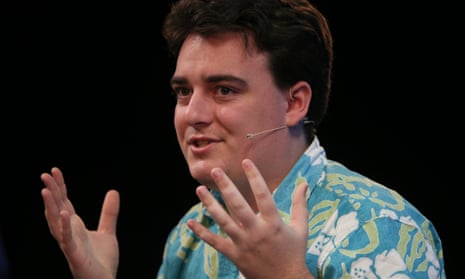Games were the earliest showcases for virtual reality company Oculus VR’s technology, but its founder Palmer Luckey thinks it will have important applications for education in the future.
“I think there’s a lot of potential for virtual reality in the education industry … Classrooms are broken. Kids don’t learn the best by reading books,” he said at the Web Summit conference in Dublin.
“There’s clearly value in real-world experiences: going to do things. That’s why we have field trips. The problem is that the majority of people will never be able to do the majority of those experiences.”
Luckey cited the example of children at schools in Washington DC being able to “go down the street” and visit the Smithsonian Museum, which is a much more expensive field trip for pupils elsewhere in the US, let alone the world.
He also used the idea of a virtual trip to Paris as a defence against critics who suggest VR will never live up to real life experiences.
“People could say: ‘But visiting France virtually will never be the same as visiting Paris in the real world.’ Well, it might not be the same. What matters a lot more is that everybody is able to experience it. Even if visiting Paris for real is something that’s better [than doing it with VR] it’s not something that eight, nine, 10 billion people in the world are going to be able to do.”
When Facebook bought Oculus VR for $2bn, the company was closely identified with games, but Luckey said the association between VR and games is relatively recent.
“If you look back at virtual reality over the decades, in the 70s, 80s and 90s it was not about gaming. It was about a wide variety of things, games included, but it was really about these parallel digital universes,” he said.
Luckey admitted that for now, virtual reality remains a niche, partly because with headsets like his company’s Oculus Rift, the baseline requirement is a computer costing upwards of $1,000.
“Most people don’t have computers with high-end graphics cards. In the future, that’s going to change: give it five or six years, and most computers will be capable of running good virtual experiences,” he said.
“Right now it’s going to be this niche just because of the equipment … but you can still sell many millions of units.”
Oculus VR is working with Samsung on the latter company’s Gear VR device, a headset that uses the owner’s smartphone as its computer. But Luckey made the bold prediction that in the long term, VR may be more popular than smartphones.
“I’m really biased, but I really do believe it’s going to be more ubiquitous than the smartphone,” he said.
“Augmented reality and virtual reality are going to converge in the same sorts of hardware that you wear and carry around with you all the time, so there’s no reason to think it can’t supplant everything we already do with smartphones, and lead to other applications.”
“It’s probably not the next five or even 10 years before virtual reality surpasses smartphones, but I’d be very surprised if 15 years from now, we’re all still carrying around little slabs in our pocket that we have to pick out and use, when instead we can just project virtual information into our environment.”
Luckey said that Oculus VR is working on serving more senses than just sight and hearing, including technologies around “scent and touch”. He also side-stepped a question about how VR will change our relationships and “physical intimacy” by focusing on communication rather than sex.
“If we look at what our relationships are built around today with digital technology, it’s around email, text messages, Instagram, Facebook … Sharing pictures and moments with each other. But most forms of digital communication are pretty limited compared to real life,” he said.
“If you have virtual reality that’s perfect – not even perfect, but good enough in many areas – you can start having people start to communicate digitally in a much more human way. They feel as if they’re face to face with the person, even if they’re on different continents.”
Luckey hailed the potential for VR films, but warned that “telling stories in virtual reality is very different to telling stories through traditional films or even video games – it’s going to be a long time until virtual reality storytelling is nearly as refined as film. Decades.”
He also warned that the future for VR is “not going to look like any of the sci-fi depictions of it”, citing The Matrix and Snow Crash as specific examples that people have got hung up on.
“Virtual reality is a science fiction technology, it’s right up there with artificial intelligence and space travel and time travel and robots and flying cars,” he said. “To be able to work on that and have it actually become real is one of the best things I can imagine working on.”

Comments (…)
Sign in or create your Guardian account to join the discussion